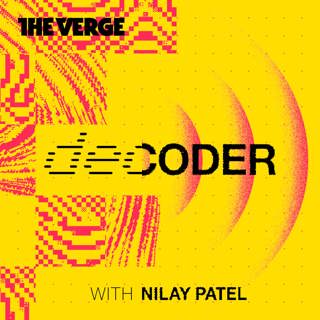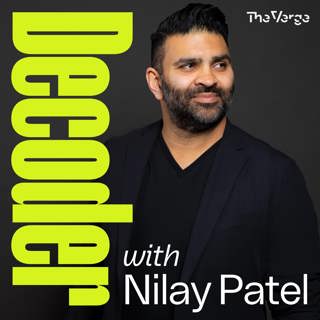
The people who make your apps go to Stack Overflow for answers – here's how it works
Today I'm talking to Prashanth Chandrasekar the CEO of Stack Overflow – a highly specialized kind of social network, with a really unique business model. If you don't know Stack Overflow is a major part of the modern software development landscape: it’s where developers come together, ask questions, and get answers about how to build software, including actual code they can use in their own projects. It’s basically a huge question and answer forum. More than 100 million people visit Stack Overflow every single month. The company also sells Stack Overflow as an internal forum tool that big companies can use for their own teams: Microsoft, Google, Logitech—you name it, they’re using Stack Overflow to coordinate conversations between their engineers. The platform has a long reputation of elitism; Prashanth himself is a developer and he told me his own first experience on Stack Overflow was a negative one. In fact, he took over as CEO about three years ago, after a pretty serious moderation controversy that saw several longtime Stack Overflow moderators quit. I wanted to talk to Prashanth about how it works, how the company makes money, and how to grow such a specialized user base while still being welcoming to new people. Links: Software-as-a-Service (SaaS) Stack Overflow Sold to Tech Giant Prosus for $1.8 Billion Stack Overflow helps millions of developers do their jobs every single day. Its new CEO says the next stage of its growth is selling to businesses. Big Tech's hiring freeze unlocks rich talent pool for U.S. startups Stack Overflow raises $85M in Series E funding to further accelerate SaaS business Chris Dixon thinks web3 is the future of the internet — is it? Stack Overflow Has a New Code of Conduct: You Must 'Be Nice' Code of Conduct - Stack Overflow Eight great sites that offer online classes The other side of Stack Overflow content moderation Everything you need to know about Section 230 Transcript: https://www.theverge.com/e/23185361 Credits: Decoder is a production of The Verge, and part of the Vox Media Podcast Network. Today’s episode was produced by Creighton DeSimone and Jackie McDermott and it was edited by Callie Wright. The Decoder music is by Breakmaster Cylinder. Our Sr Audio Director is Andrew Marino and our Executive Producer is Eleanor Donovan. Learn more about your ad choices. Visit podcastchoices.com/adchoices
25 Okt 20221h 6min

Why Signal won’t compromise on encryption, with president Meredith Whittaker
Meredith Whittaker is the president of Signal, the popular messaging app that offers encrypted communication. You might recognize Meredith’s name from 2018 when she was an AI researcher at Google and one of the organizers of the Google walkout. Now she’s at Signal, which is a little different than the usual tech company: it’s operated by a nonprofit foundation and prides itself on collecting as little data as possible. But messaging apps are a complicated business. Governments around the world really dislike encrypted messaging and often push companies to put in backdoors for surveillance and law enforcement because criminals use encrypted messaging for all sorts of deeply evil things. But there’s no half step to breaking encryption, so companies like Signal often find themselves in the difficult position of refusing to help governments. You might recall that Apple has often refused to help the government break into iPhones, for example. I wanted to know how that tradeoff plays out at Signal’s much smaller and more idealistic scale. This is a good one, with lots of Decoder themes in the mix. We have to start doing checklists or something. Okay, Meredith Whittaker, president of Signal. Here we go. Links: The battle inside Signal Yes, even Signal is doing stories now Here’s why Apple’s new child safety features are so controversial Signal is ‘starting to phase out SMS support’ from its Android app A very brief history of every Google messaging app RCS: What it is and why you might want it Let’s chat about RCS WhatsApp is now entirely end-to-end encrypted Moxie Marlinspike has stepped down as CEO of Signal Meredith Whittaker Tweet Transcript: https://www.theverge.com/e/23173757 Credits: Decoder is a production of The Verge, and part of the Vox Media Podcast Network. Today’s episode was produced by Creighton DeSimone and Jackie McDermott and it was edited by Jackson Bierfeldt. The Decoder music is by Breakmaster Cylinder. Our Sr Audio Director is Andrew Marino and our Executive Producer is Eleanor Donovan. Learn more about your ad choices. Visit podcastchoices.com/adchoices
18 Okt 20221h 12min

Mark Zuckerberg on the Quest Pro, future of the metaverse, and more
Meta CEO Mark Zuckerberg joined The Verge’s deputy editor Alex Heath for an in-depth conversation about the company’s new high-end, mixed reality headset, the $1,499 Quest Pro, and why he isn’t backing down from building the metaverse. Zuckerberg and Heath also talked about the future of social media, why he enjoys “being doubted,” and the growing concerns about TikTok’s Chinese ownership. Links: The Meta Quest Pro is a cutting-edge headset looking for an audience Xbox Cloud Gaming is coming to the Meta Quest Apple’s mixed reality headset will reportedly come with an M2 chip We finally got our hands and eyes on the PlayStation VR2 Apple’s app tracking policy reportedly cost social media platforms nearly $10 billion Mark Zuckerberg took on China in a speech defending free expression Why BeReal is breaking out Elon Musk is buying Twitter, probably? Transcript: https://www.theverge.com/e/23161228 Credits: Decoder is a production of The Verge, and part of the Vox Media Podcast Network. Today’s episode was produced by Creighton DeSimone, Vjeran Pavic, and Jackie McDermott and it was edited by Callie Wright. The Decoder music is by Breakmaster Cylinder. Our Sr Audio Director is Andrew Marino and our Executive Producer is Eleanor Donovan. Learn more about your ad choices. Visit podcastchoices.com/adchoices
11 Okt 20221h

Pat Gelsinger came back to turn Intel around – here’s how it’s going
Today I'm talking to Pat Gelsinger, the CEO of Intel. I’ve been excited to have this conversation for a very long time – ever since Pat took over as CEO a little over a year and a half ago. After all. Intel is a very important company with a huge series of challenges in front of it. It’s still the largest chip manufacturer by revenue, and makes more chips than any other company in the United States. In fact there are basically only three major chip manufacturers: Taiwan Semiconductor Manufacturing Company, or TSMC, which is in Taiwan, Samsung, based in South Korea. And Intel, here in the United States. The Intel Pat took over was struggling, and was losing ground to in a variety of markets. But in the past year and a half, Pat’s restructured the company, turned over almost all of its leadership positions, opened a new line of business that would compete with TSMC and make chips for other companies including Intel’s competitors, and generally tried to reset Intel’s famous engineering culture around engineering. Glossary: IFS - Intel Foundry Service. Raptor Lake - codename for intel's Gen 13 processors that were just the day before we had our conversation. Sapphire Rapids - the codename for Intel's 4th generation Xeon server processors. 20A and 18A - 20A is a rebranding of what was intel's 5nm process scheduled to debut in 2024 and 18A is a rebranding of Intels 5nm+ node due out in 2025. Packaging - integrated circuit packaging is the last step of semiconductor fabrication. It's where a block of semiconductor material is put into a case. The case, is known as a "package" and that is what allows you put a circuit on a board. Wafers - When a processor is made they make processors you make hundreds of them at once on a giant wafer. EUV - is Extreme Ultraviolet Lithography. It's the most advanced way to make chips. ASML - Is the company that makes the machines that lets you make chips. They are the only company that makes EUV machines. RibbonFET - A new transistor technology that Intel developed. ISV - Independent Software Vendors. PDK - Process Design Kit is a set of files that have data and algorithms that explain the manufacturing parameters for a given silicon process. EDA tools - stands for Electronic Design Automation tools. Basically software tools that are used to design and validate the semiconductor manufacturing process. Robert Noyce and Gordon Moore - the founders of Intel. Andy Grove - employee #3 who went on to become one of their most successful CEOs. Links: Moore's Law Intel is replacing its CEO in February Intel has to be better than ‘lifestyle company’ Apple at making CPUs, says new CEO Apple is switching Macs to its own processors starting later this year Apple MacBook Air with M1 review: new chip, no problem What we know about Intel’s $20 billion bet on Ohio Intel is building a new €17 billion semiconductor manufacturing hub in Germany Intel delays ceremony for Ohio factory over lack of government funding Intel needs 7,000 workers to build its $20 billion chip plant in Ohio Biden signs $280 billion CHIPS and Science Act President Joe Biden speaks after groundbreaking for Intel’s $20 billion semiconductor plant Intel’s top Arc A770 GPU is priced at $329, available October 12th Intel’s 13th Gen processors arrive October 20th with $589 flagship Core i9-13900K Transcript: https://www.theverge.com/e/23149693 Credits: Decoder is a production of The Verge, and part of the Vox Media Podcast Network. Today’s episode was produced by Creighton DeSimone and Jackie McDermott and it was edited by Callie Wright. The Decoder music is by Breakmaster Cylinder. Our Sr Audio Director is Andrew Marino and our Executive Producer is Eleanor Donovan. Learn more about your ad choices. Visit podcastchoices.com/adchoices
4 Okt 20221h 8min

How Arm conquered the chip market without making a single chip, with CEO Rene Haas
One of the more interesting quirks of the modern tech world is that there’s a really important company at the center of it all that doesn’t make anything. But its work is in your phone, in your TV, your car and maybe even your laptop. I’m talking about ARM, a chip design company that’s been through quite a lot these past few years, and I'm talking to Arm CEO Rene Haas. Arm designs the instruction sets for modern chips: Qualcomm’s chips are Arm chips. Apple’s chips are Arm chips. Samsung’s chips are Arm chips. It’s the heart of modern computing. Arm licenses the instruction set to those companies, who then go off and actually make chips with all sorts of customizations. Basically every smartphone runs an Arm processor, Apple’s Macs now run arm processors, and everything from cars to coffee machines are showing up with more and more arm processors in them. We want to know what you think about Decoder. Take our listener survey! Transcript: https://www.theverge.com/e/23137412 Links: The Vergecast: The HDMI Holiday Spec-tacular on Apple Podcasts Biden signs $280 billion CHIPS and Science Act Intel needs 7,000 workers to build its $20 billion chip plant in Ohio - The Verge What comes after the smartphone, with Qualcomm CEO Cristiano Amon - The Verge Why the global chip shortage is making it so hard to buy a PS5 Nvidia’s huge Arm deal has just been scrapped What is a SoC? What is an ECU? Credits: Decoder is a production of The Verge, and part of the Vox Media Podcast Network. Today’s episode was produced by Creighton DeSimone and Jackie McDermott and it was edited by Callie Wright. The Decoder music is by Breakmaster Cylinder. Our Sr Audio Director is Andrew Marino. Our Editorial Director is Brooke Minters. And our Executive Producer is Eleanor Donovan. Learn more about your ad choices. Visit podcastchoices.com/adchoices
27 Sep 20221h 2min

Can software simplify the supply chain? Ryan Petersen thinks so
Ryan Petersen, is the CEO of Flexport, ac ompany that builds software that integrates all the different shipping vendor systems you might run into as you try to get a product from a factory in China to a consumer in Idaho: rail, sea, truck. We’ve talked about the supply chain and inventory management on Decoder with a lot of our guests — the chip shortage seems to affect every company, and sorting out how to get products made and delivered on time is a pretty universal problem. But we haven’t really talked about how products get from one place to another around the world. So I wanted to talk to Ryan, figure out what Flexport’s role in all this is, what his bigger supply chain solutions would be, and why he’s leaving his job as CEO to be executive chairman and handing the reins to Dave Clark, who used to work at Amazon. Links: Dave Clark to Join Flexport As Our New CEO Flexport Wants to Be Uber of the Oceans At Google, Eric Schmidt Wrote the Book on Adult Supervision The real story behind a tech founder’s ‘tweetstorm that saves Christmas’ Ryan's twitter thread Transcript: https://www.theverge.com/e/23126062 Credits: Decoder is a production of The Verge, and part of the Vox Media Podcast Network. Today’s episode was produced by Creighton DeSimone and Jackie McDermott and it was edited by Callie Wright. The Decoder music is by Breakmaster Cylinder. Our Sr Audio Director is Andrew Marino. Our Editorial Director is Brooke Minters. And our Executive Producer is Eleanor Donovan. Learn more about your ad choices. Visit podcastchoices.com/adchoices
20 Sep 20221h 2min

Everyone knows what YouTube is. Few know how it really works.
Today, I’m talking to Mark Bergen, a reporter at Bloomberg and the author of a new book about YouTube called. Like, Comment, Subscribe: Inside YouTube’s Chaotic Rise to World Domination. YouTube has always been fascinating to me because it’s such a black box: everyone feels like they know how the platform works, but very few people have a real understanding of the internal politics and tradeoffs that actually drive YouTube’s decision. Mark’s book is one of the best of its kind I’ve read: not only does he take you inside the company, but he connects the decisions made inside YouTube to the creators who use the platform and the effects it has on them. This was a fun one – keep in mind that for as little as we might know about YouTube, we might know even less about TikTok, which is driving all sorts of platforms, even YouTube, into competing with it. Transcript: https://www.theverge.com/e/23113078 Links: YouTube Partner Program Hank Green on Decoder iJustine Credits: Decoder is a production of The Verge, and part of the Vox Media Podcast Network. Today’s episode was produced by Creighton DeSimone and Jackie McDermott and it was edited by Callie Wright. The Decoder music is by Breakmaster Cylinder. Our Sr Audio Director is Andrew Marino. Our Editorial Director is Brooke Minters. And our Executive Producer is Eleanor Donovan. Learn more about your ad choices. Visit podcastchoices.com/adchoices
13 Sep 20221h 4min

Rewind: How big companies kill ideas — and how to fight back, with Tony Fadell
This episode was originally published on May 3rd, 2022. Tony Fadell was instrumental in the development of the iPod and iPhone at Apple and then co-founded Nest Labs, which kicked off the consumer smart home market with its smart thermostat in 2011. Tony sold Nest to Google for $3.2 billion in 2014 and eventually left Google. He now runs an investment company called Future Shape. Links: Inside the Nest: iPod creator Tony Fadell wants to reinvent the thermostat General Magic - Trailer Inside Facebook’s metaverse for work Silicon Graphics Google is reorganizing and Sundar Pichai will become new CEO Fire drill: can Tony Fadell and Nest build a better smoke detector? Google purchases Nest for $3.2 billion Twitter accepts buyout, giving Elon Musk total control of the company Nest is rejoining Google to better compete with Amazon and Apple Apple Music Event 2005 - Motorola Rokr E1 / iTunes Phone Activision Blizzard hit with another sexual harassment lawsuit Nest buying video-monitoring startup Dropcam for $555 million What matters about Matter, the new smart home standard ZIGBEE ON MARS! Directory: Steve Jobs, CEO of Apple Andy Grove, former CEO of Intel Pat Gelsinger, current CEO of Intel Sundar Pichai, current CEO of Alphabet Elon Musk, CEO of Tesla, SpaceX, and The Boring Company Jeff Williams, COO of Apple Matt Rogers, Nest co-founder Jeff Robbin, VP of consumer applications at Apple Steve Hoteling, former CEO gesture recognition company Finger Works Jon Rubinstein, senior VP of the iPod division at Apple Steve Sakomen, hardware engineer and executive at Apple Avie Tavanian, chief software technology officer at Apple Scott Forstall, senior VP of iOS software, Apple Jony Ive, chief design officer, Apple Transcript: https://www.theverge.com/e/22817673 Credits: Decoder is a production of The Verge, and part of the Vox Media Podcast Network. Today’s episode was produced by Creighton DeSimone and Jackie McDermott and it was edited by Callie Wright. The Decoder music is by Breakmaster Cylinder. Our Sr Audio Director is Andrew Marino and our Executive Producer is Eleanor Donovan. Learn more about your ad choices. Visit podcastchoices.com/adchoices
6 Sep 20221h 16min






















